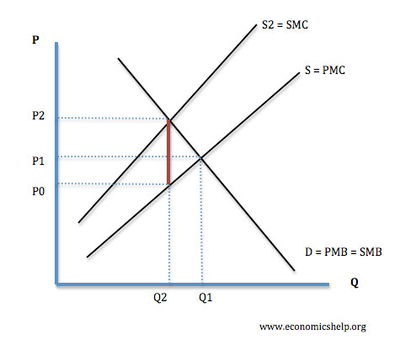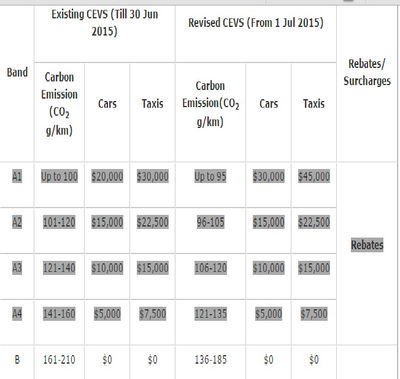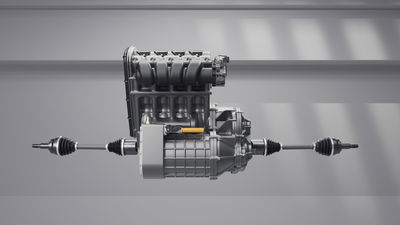#Ecarnomics: Emissions Tax on a Tesla?
Introduction
Many of you have heard about the poor fellow in Singapore who bought a secondhand Tesla Model S…and had it slapped with a $15,000 emissions tax. Now if you think this is absurd, you certainly wouldn’t be alone.
Introduction
Many of you have heard about the poor fellow in Singapore who bought a secondhand Tesla Model S…and had it slapped with a $15,000 emissions tax. Now if you think this is absurd, you certainly wouldn’t be alone. Even the CEO/Personality Cult of Tesla Motors, Elon Musk, has weighed in on the debacle. Being a student of economics, I couldn’t help but investigate the mechanics behind Singapore’s carbon tax, as well as the reason why an electric car was subjected to a tax equal to the highest-emitting passenger cars on sale in Singapore.

How Does Singapore’s Carbon Tax Work?
The basic principle of a carbon tax is to provide people with an economic incentive to reduce their emissions. In other words, it essentially puts a dollar value on the pollutant. That value doesn’t come out of thin air—there are a number of different ways to determine how valuable a clean environment is. You can either assess the cost of damages caused directly by air pollution (e.g. medical expenses, lost wages due to illness); or you can try and impute a market value for the resource based on what lengths people will go to have a clean environment.
In Singapore, the carbon tax depends on how much carbon dioxide your vehicle emits. The system categorizes vehicles into brackets based on emissions. Low-emission vehicles (A1-A4 below) actually qualify for a tax rebate. B-class (medium emission) vehicles receive no subsidies and are not taxed, while C-class vehicles (high emissions) are taxed. The criteria for carbon taxation is laid out by the Land Transportation Authority of Singapore.

That’s Great, Why Is a Tesla Being Taxed?
Of course, you are probably wondering why an all-electric Tesla is being charged $15,000 for carbon pollution? The answer, according to the LTA, is simple: although the Model S does not produce the emissions in the same way as a gas vehicle, the emissions caused by electricity generation must be accounted for. The rate of carbon produced per unit of energy is 0.5g/Wh, If the Tesla was reported to consume 444 Wh per km, that leaves a carbon emission equivalent of 222g/km, putting the Tesla in the highest bracket.

Ok…but…
The notion that the Tesla should be charged for carbon emissions seems pretty absurd, but one could argue that Singapore’s logic is sound: after all, electricity generation does often produce greenhouse gases. The way I see it, this argument makes no sense. Presumably, Singapore has at least some sort of environmental standard for all GHG-producing industries, including oil refineries and power plants. On that note, refining oil into gasoline produces a lot of greenhouse gases that are not reflected in Singapore’s carbon tax policy. Furthermore, a Tesla does not generate additional pollutants by being driven, but a gasoline-powered car does.
If Singapore’s argument is that electric cars are somehow responsible for as many, if not more GHGs than petroleum-powered beasts, they are clearly wrong. If the argument is that electricity-powered vehicles still need to account for the CO2 going into the atmosphere, why aren’t they instead focusing on taxing the electricity producers? Why have they not extended the tax to cell phones, lights, cell phones, and other electricity-dependent items?
My Verdict
Clearly, I think that Singapore’s decision with the Tesla Model S of Joe Nguyen is one made by ideology, and not actual fairness. I believe that perhaps they overestimated on their subsidies of low-emission vehicles, and that taxing EVs accordingly would be the only way to keep the government from hemorrhaging money. Certainly, it’s not because the Tesla is worse for the environment. We can put that argument to rest right away.
However, Singapore has now set a dangerous precedent. If the public response is positive, there’s no reason why other nations can’t follow suit. I really hope they don’t, because not only is carbon-taxing an EV absurd, it just seems like a deliberate witch-hunt on the one strong enemy of the petrochemical industry. It’s time to admit it—Singapore is abusing their carbon tax system. They’re no longer maximizing public welfare, they’re reducing it instead.













Comments
Good thing Amazon don’t pay tax hey!
Is that the Tesla dealer in Chinook Mall?
Nope this one is in London
I truly find this stupid, CO2 has accounted less then 1% damage to the planet, and CO2 may I add is 75% H2O.
This is a really well written article based on actual facts, we need more of these!
When you buy an electric vehicle, you’re just moving the tail pipe to the electric plant down the road unless your area has a clean energy production facility. In fact, there’s A LOT of loss in the lines and in the system that delivers the energy to your e-car. Nothing’s free. Gas powered cars are surprisingly efficient, but people don’t like to SEE the pollution, they’d rather it happen out of sight.
Best case scenario is if your country is importing electricity from surrounding countries. Or if they spend some serious money on clean energy. :D
Oil refineries make a ton of pollution too, so the Tesla actually does solve half the problem
Great post mate!
At least on the bright side, I’m not living in Singapore. I live near there.
Thats right up there with the Australian government looking for a way to tax the electricity used by electric cars to gain revenue
Norway or Sweden (not sure) is changing all their government vehicles to electric and urges the citizens to do the same. They will achieve this by taxing every ICE equipped car with ridiculously high taxes. For a price of a model s you could only buy a Golf and that’d absurd too, but at least they have a point saying fossil fuel burners pollute.
2 sides to this. First of all governments will do anything to extract every penny you have and fairness is not a word in their vocabularies, no matter which country we’re talking about (in general). Second: I realize I am in a minority with this but… EVs are not zero emission vehicles no matter how you put it. The cost and byproducts of production. The batteries which are recycleable but not 100% , the cost of producing electricity for them as stated, etc. I am for taxing them too, based on this, but in no way put them in a gas guzzler category… that is just government idiocy.
Pagination